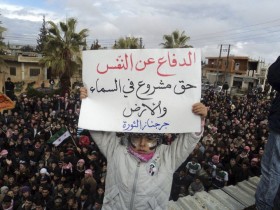 Syrian opposition leaders have rejected assurances from President Bashar al-Assad that he will cease his regime’s violent crackdown against demonstrators following talks with the Russian foreign minister.
Syrian opposition leaders have rejected assurances from President Bashar al-Assad that he will cease his regime’s violent crackdown against demonstrators following talks with the Russian foreign minister.
During an emergency visit to Damascus, Sergei Lavrov received a promise from Assad that he was ready to agree to an end to the violence that has killed at least 6,000 people since the revolt erupted last March. However, Assad still insisted his government had the right to go after people he called “armed terrorists.”
The Syrian opposition, after nearly a year of relentless bloodshed, said it’s too late for any negotiations.
“It is impossible for Assad to govern after bombarding his own cities and towns,” opposition leader-in-exile Kamal al-Labwani told Reuters.
“He is escalating the use of his military might either to sink Syria into chaos or to improve his negotiating position.”
Similarly, Walid al-Bunni, a senior member of the opposition Syrian National Council, told Reuters: “The crimes that have been committed have left no room for Bashar al-Assad to remain ruler of Syria.”
Lavrov went to Syria immediately after Russia and China caused an international outrage by vetoing a resolution by the United Nations Security Council to condemn the Syrian regime.
The Russian foreign minister called for dialogue between Assad’s government and opposition members.
“We have every reason to believe that the signal that we’ve brought here to move along in a more active manner along all directions has been heard,” he said.
“In particular, President Assad assured [us] that he is fully committed to the task of a cessation of violence, from whatever source it comes.”
Lavrov also called for a solution based on a prior peace proposal by the Arab League, but did not indicate that he supported the League’s demand that Assad step down and relinquish power to a deputy.
The U.S. also rejected the notion that Assad is committed to any meaningful changes in Syria.
“Russia must realize that betting everything on Assad is a recipe for failure, not just for Russia’s interests in Syria but for the stability of the region and for Syria’s future,” said White House spokesman, Jay Carney, in a statement.
Assad is becoming increasingly isolated. On Tuesday, Persian Gulf states recalled their ambassadors from Damascus and expelled Syrian envoys from their countries, on the heels of similar steps taken by the U.S. and other western nations.
Meanwhile, Syrian government soldiers maintained a heavy bombardment on the city of Homs on Wednesday, according to human rights activists. At least 40 people have been killed by the shelling, after hundreds have died in the past few weeks.
“Some areas are completely [besieged],” an activist named Hadi al-Abdallah in Homs told Al Jazeera. “There is no internet, no landlines or mobile lines.”
Another Homs resident said, “Mortar and rocket fire has subsided, but heavy machineguns and anti-aircraft guns are still strong. Tanks are in main thoroughfares in the city and appear poised to push deep into residential areas.”
Clashes and killings have also been reported in various other Syrian cities, including Zabadani and Hama. However, since foreign media is banned from Syria, such details cannot be verified.
Navi Pillay, the human rights chief at the UN, again called for foreign action to protect Syrian civilians.
“I am appalled by the Syrian government’s willful assault on Homs, and its use of artillery and other heavy weaponry in what appear to be indiscriminate attacks on civilian areas in the city,” she said in a statement.
“The failure of the [UN] Security Council to agree on firm collective action appears to have fuelled the Syrian government’s readiness to massacre its own people in an effort to crush dissent.”
However, after returning to Moscow, Lavrov told reporters that foreign intervention in Syria should be prohibited.
“Any outcome of national dialogue should become the result of agreement between the Syrians themselves and should be acceptable to all the Syrians,” he said.
“On both sides [of Syria] there are people that aim at an armed confrontation, not a dialogue”.
IBT
Photo: A child holds up a sign that reads “Self defense is our legitimate right.” ( Reuters)

Leave a Reply
You must be logged in to post a comment.